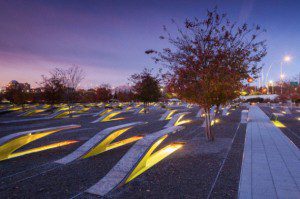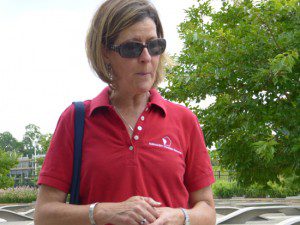
It was the tail end of a travel junket. By that I mean I was touring parts of Virginia (near Washington, D.C.) with several other writers and broadcasters. We had been invited there by a state tourism consortium in hopes we would write glowing stories about such tourist spots as Alexandria, former stomping grounds of George Washington; Manassas, with its showcase U.S. Marine Corps Museum; and Arlington, home of the Arlington National Cemetery.
But, on the last day, our guides took us to the west side of the U.S. Pentagon just across the Potomac River from D.C. There we entered a park area, with benches and stunted trees. A woman approached us.
“Are you the Canadian writers?” she asked. Then, she introduced herself. “I’m a volunteer. My name is Laurie Laychak.”
I still didn’t get it. “Volunteer?” I asked. And I looked around at the stainless steel benches inlaid with granite and the Crape Myrtle trees.
“Welcome to the Pentagon 9/11 Memorial… I lost my husband David Laychak, here in the terrorist attacks on Sept. 11, 2001.”
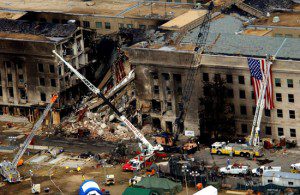
Just after 9:30 that morning, American Airlines Flight 77, travelling at about 500 miles per hour, roared over a slight rise in Virginia’s iconic Arlington National Cemetery, clipped ground antennae, bounced off the ground near Washington Boulevard and ploughed into the first floor on the west side of America’s (then) 58-year-old defense department headquarters. The resulting explosion killed all 59 passengers and crew on the jetliner (as well as its hijackers) and 125 inside the Pentagon. Standing metres from the point of impact, Laurie Laychak gestures in the air to illustrate the five rings of offices within the Pentagon; the outer-most ring was where David worked that morning in his role as a civilian budget analyst for the U.S. Army.
“He was literally at ground zero, where the plane hit,” she said.
That Tuesday morning 13 years ago, Laurie Laychak worked as a substitute teacher at an elementary school where they lived in Manassas, Virginia. The school office contacted her to say there’d been an attack on the Pentagon. With all Washington-area phone systems jammed she couldn’t reach David by phone; she told their two children – Zachary nine and Jennifer seven – there’d been a fire where their father worked.
On Wednesday she began calling area hospitals. On Thursday an impromptu support centre told David’s brother and sister, “if you haven’t heard from your loved ones by now, they’re gone.” Searching for the words to explain to her children Laurie admitted it was the lowest moment of her life.
“I cry over Hallmark cards and Disney movies,” she said. “Not in my wildest dreams would I have thought a plane would fly into the Pentagon.”
David Laychak and Laurie Miller met at the Pentagon in 1984, Laurie told me. They’d both come from families with military backgrounds and according to the alumni magazine for Brown University (David’s alma mater) the two were among the youngest working in the office and fell in love. They moved to Arizona for a while, but in 2000 David was offered a promotion back at the Pentagon, and they returned to Virginia.
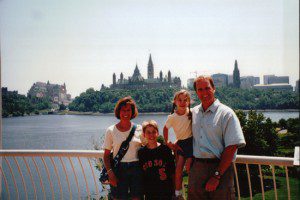
Son Zachary had no patience with his father’s death. Just disbelief. Why would someone do this to his dad? How could someone as strong as his dad be gone? Denial turned to anger. Zach wore a bracelet with his father’s name engraved on it and never took it off. He became a fan of America’s war against terror and even years later “felt pure joy” when Osama bin Laden was killed. Zachary has nearly completed a degree in political science and communications and is considering law school.
When the anniversary ceremonies came along, Laurie gave her children the option of attending. Both did initially. Laurie said her daughter Jennifer – seven at the time of David’s death – responded differently from Zach. At first she cried a lot and slept with her mom. Then she took to writing down her thoughts. Today, Jennifer Laychak studies psychology and the neuro-sciences at university.
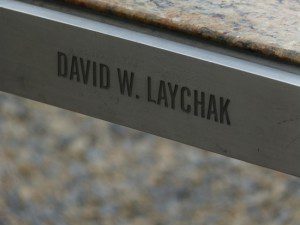
Laurie has remarried because she didn’t see herself playing the widow role “becoming an old lady in a black veil. How can I be a widow? I was 39,” when 9/11 happened. And despite the tears that inevitably recur, she makes herself available to take visitors to her husband’s memorial bench at least three hours a month.
Leading the visiting Canadian journalists through the Pentagon Memorial garden last summer, Laurie Laychak pointed to the fully repaired west wall of the U.S. defense department headquarters. A salvaged scorched-black stone at the base of what used to be her husband’s office area was the only visible evidence that 9/11 ever happened. Then, a jet taking off from nearby Reagan National Airport, roared overhead. Laurie flinched.
“This is my reality,” she said.
Laurie says, as long as she can, she’ll be at the 9/11 Pentagon Memorial keeping David Laychak’s story alive.
